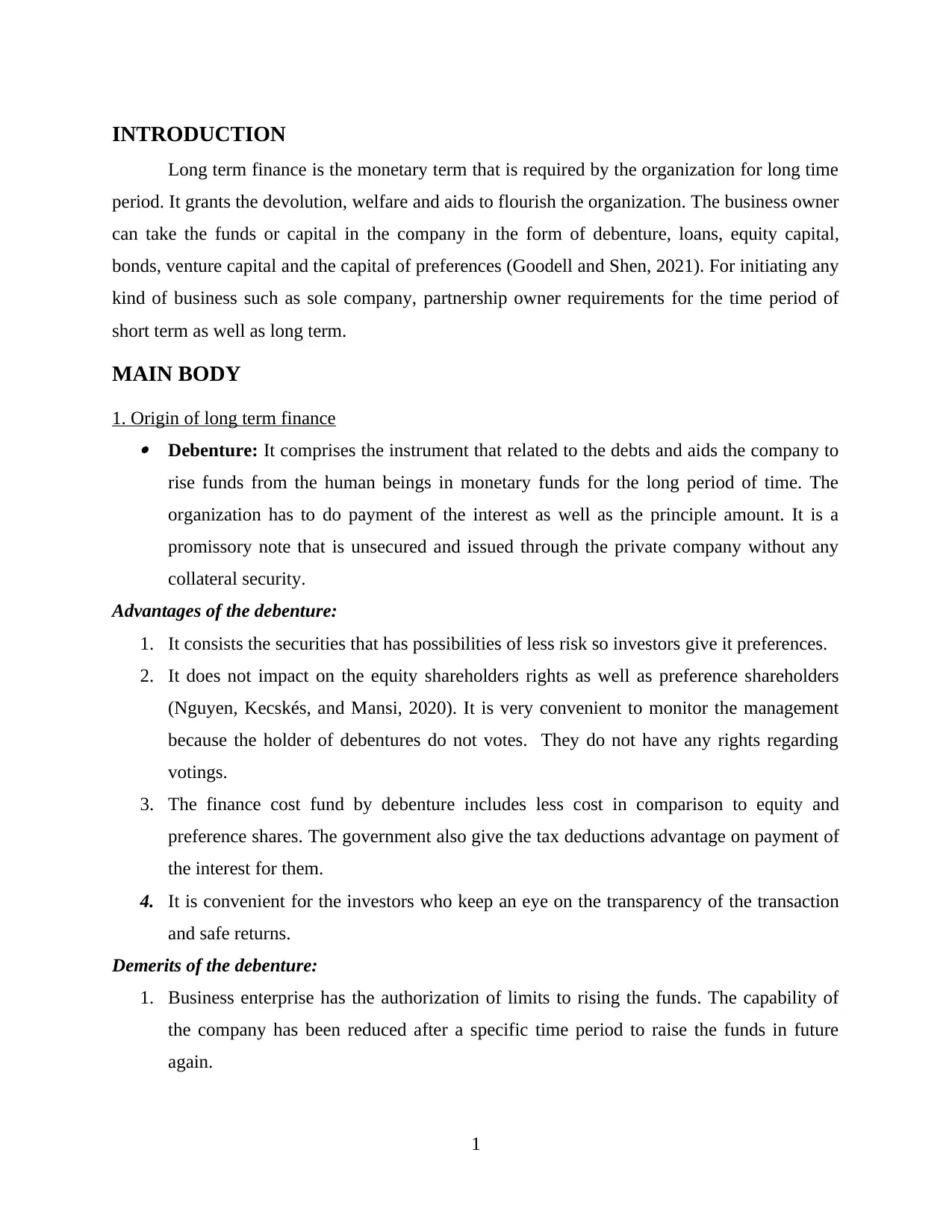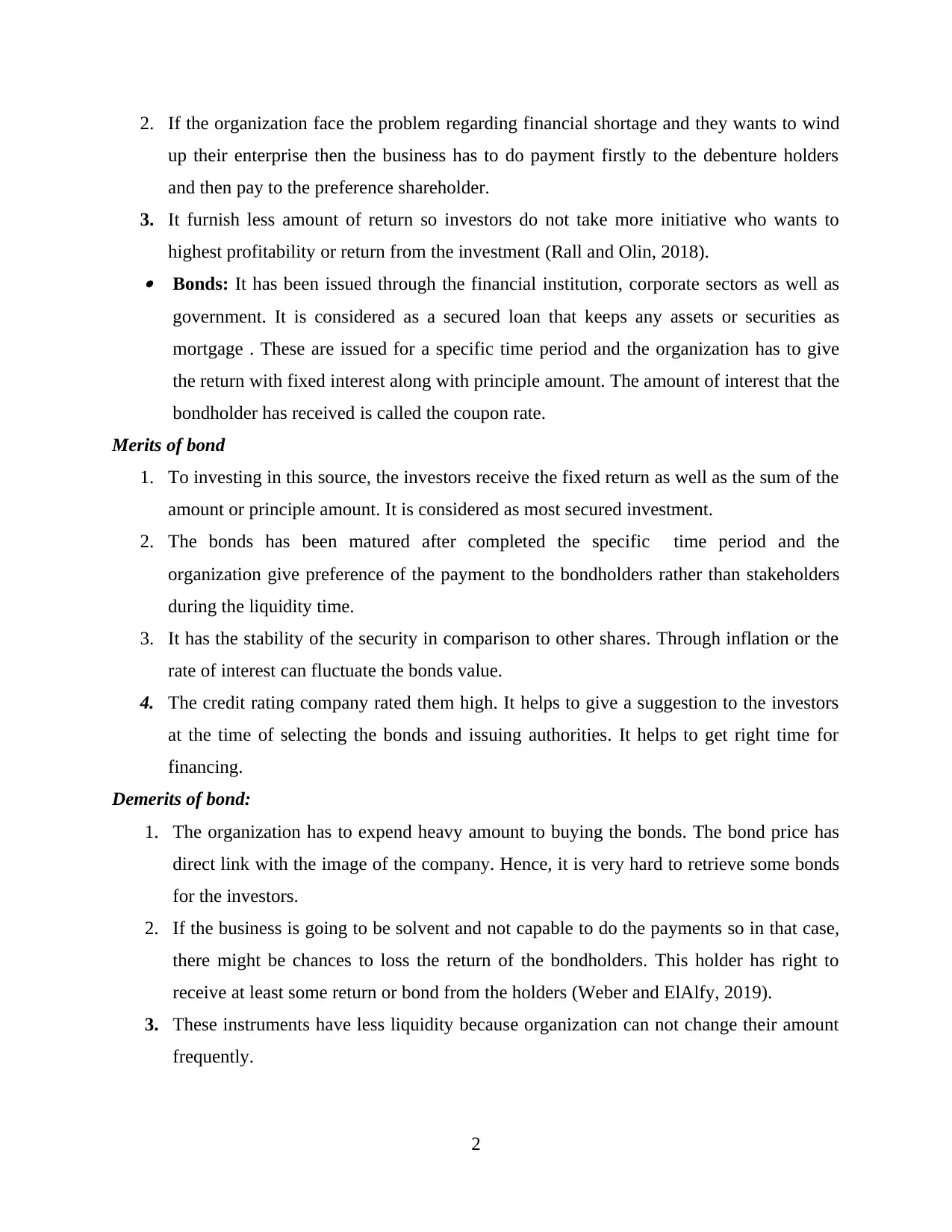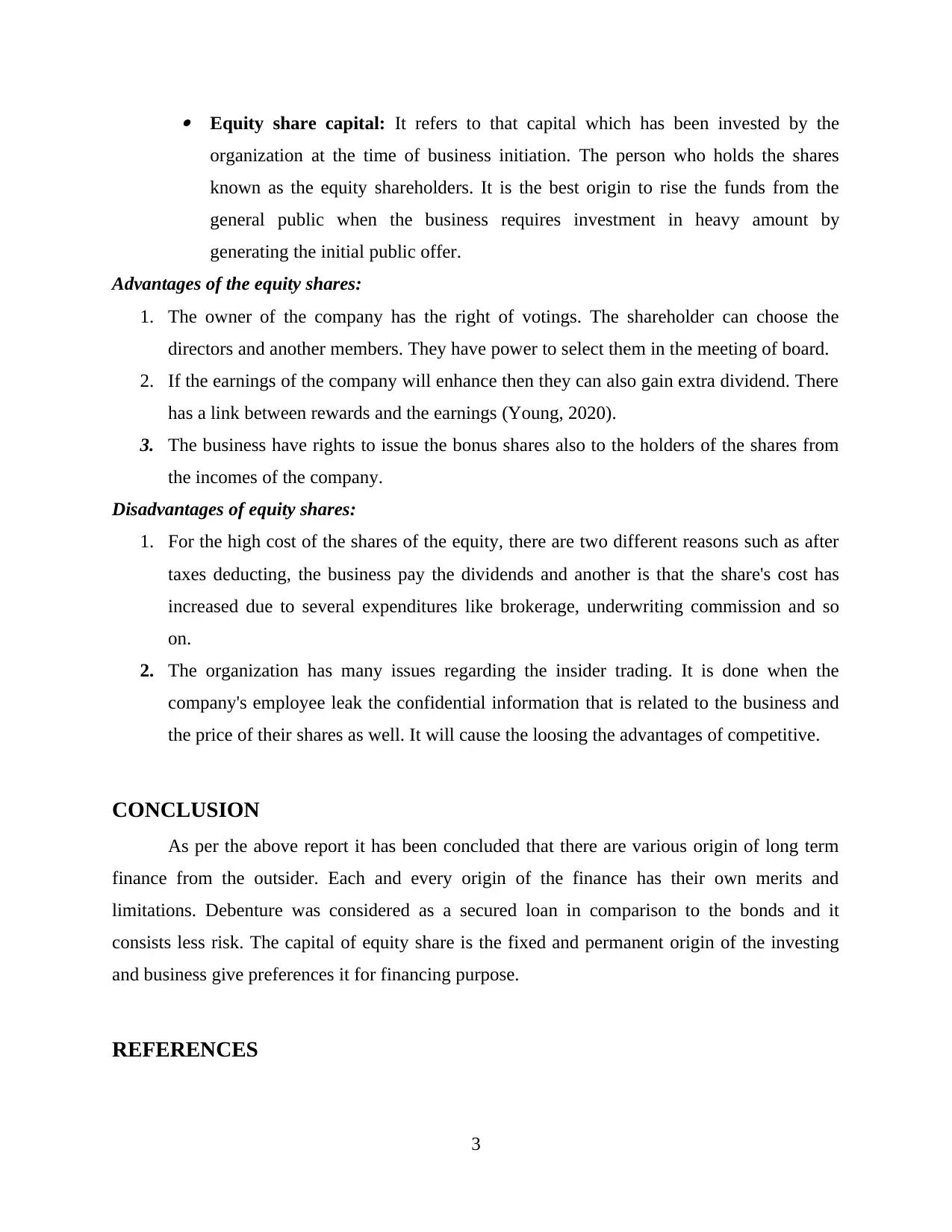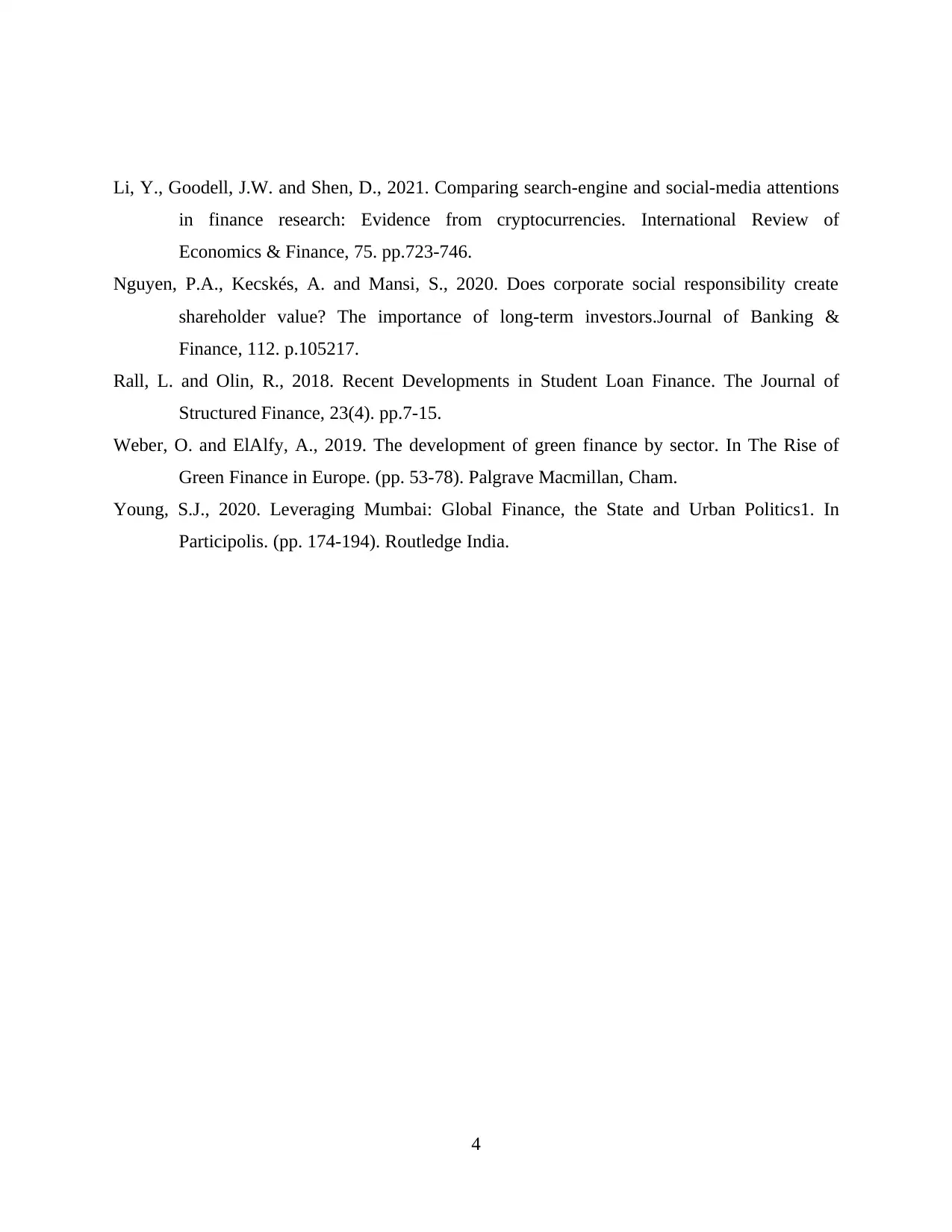Long-Term Finance Strategies: An In-Depth Look at Key Instruments
VerifiedAdded on 2023/06/07
|6
|1284
|380
Report
AI Summary
This report provides an overview of long-term finance, focusing on key sources such as debentures, bonds, and equity share capital. It examines the characteristics, advantages, and disadvantages of each instrument. Debentures are presented as debt instruments that help companies raise funds, while bonds are described as secured loans issued by financial institutions, corporate sectors, and governments. Equity share capital, representing investments by shareholders, is discussed as a primary means of raising funds through initial public offerings. The report highlights the voting rights and potential dividend gains for equity shareholders, as well as the risks of insider trading. The conclusion emphasizes that each financing source has its own merits and limitations, with debentures considered secured loans, and equity share capital a fixed, permanent source of investment. Desklib provides access to this and other solved assignments for students.

Long term finance
Paraphrase This Document
Need a fresh take? Get an instant paraphrase of this document with our AI Paraphraser

Contents
Contents...........................................................................................................................................2
INTRODUCTION...........................................................................................................................1
REFERENCES................................................................................................................................1
Contents...........................................................................................................................................2
INTRODUCTION...........................................................................................................................1
REFERENCES................................................................................................................................1

INTRODUCTION
Long term finance is the monetary term that is required by the organization for long time
period. It grants the devolution, welfare and aids to flourish the organization. The business owner
can take the funds or capital in the company in the form of debenture, loans, equity capital,
bonds, venture capital and the capital of preferences (Goodell and Shen, 2021). For initiating any
kind of business such as sole company, partnership owner requirements for the time period of
short term as well as long term.
MAIN BODY
1. Origin of long term finance Debenture: It comprises the instrument that related to the debts and aids the company to
rise funds from the human beings in monetary funds for the long period of time. The
organization has to do payment of the interest as well as the principle amount. It is a
promissory note that is unsecured and issued through the private company without any
collateral security.
Advantages of the debenture:
1. It consists the securities that has possibilities of less risk so investors give it preferences.
2. It does not impact on the equity shareholders rights as well as preference shareholders
(Nguyen, Kecskés, and Mansi, 2020). It is very convenient to monitor the management
because the holder of debentures do not votes. They do not have any rights regarding
votings.
3. The finance cost fund by debenture includes less cost in comparison to equity and
preference shares. The government also give the tax deductions advantage on payment of
the interest for them.
4. It is convenient for the investors who keep an eye on the transparency of the transaction
and safe returns.
Demerits of the debenture:
1. Business enterprise has the authorization of limits to rising the funds. The capability of
the company has been reduced after a specific time period to raise the funds in future
again.
1
Long term finance is the monetary term that is required by the organization for long time
period. It grants the devolution, welfare and aids to flourish the organization. The business owner
can take the funds or capital in the company in the form of debenture, loans, equity capital,
bonds, venture capital and the capital of preferences (Goodell and Shen, 2021). For initiating any
kind of business such as sole company, partnership owner requirements for the time period of
short term as well as long term.
MAIN BODY
1. Origin of long term finance Debenture: It comprises the instrument that related to the debts and aids the company to
rise funds from the human beings in monetary funds for the long period of time. The
organization has to do payment of the interest as well as the principle amount. It is a
promissory note that is unsecured and issued through the private company without any
collateral security.
Advantages of the debenture:
1. It consists the securities that has possibilities of less risk so investors give it preferences.
2. It does not impact on the equity shareholders rights as well as preference shareholders
(Nguyen, Kecskés, and Mansi, 2020). It is very convenient to monitor the management
because the holder of debentures do not votes. They do not have any rights regarding
votings.
3. The finance cost fund by debenture includes less cost in comparison to equity and
preference shares. The government also give the tax deductions advantage on payment of
the interest for them.
4. It is convenient for the investors who keep an eye on the transparency of the transaction
and safe returns.
Demerits of the debenture:
1. Business enterprise has the authorization of limits to rising the funds. The capability of
the company has been reduced after a specific time period to raise the funds in future
again.
1
⊘ This is a preview!⊘
Do you want full access?
Subscribe today to unlock all pages.

Trusted by 1+ million students worldwide

2. If the organization face the problem regarding financial shortage and they wants to wind
up their enterprise then the business has to do payment firstly to the debenture holders
and then pay to the preference shareholder.
3. It furnish less amount of return so investors do not take more initiative who wants to
highest profitability or return from the investment (Rall and Olin, 2018). Bonds: It has been issued through the financial institution, corporate sectors as well as
government. It is considered as a secured loan that keeps any assets or securities as
mortgage . These are issued for a specific time period and the organization has to give
the return with fixed interest along with principle amount. The amount of interest that the
bondholder has received is called the coupon rate.
Merits of bond
1. To investing in this source, the investors receive the fixed return as well as the sum of the
amount or principle amount. It is considered as most secured investment.
2. The bonds has been matured after completed the specific time period and the
organization give preference of the payment to the bondholders rather than stakeholders
during the liquidity time.
3. It has the stability of the security in comparison to other shares. Through inflation or the
rate of interest can fluctuate the bonds value.
4. The credit rating company rated them high. It helps to give a suggestion to the investors
at the time of selecting the bonds and issuing authorities. It helps to get right time for
financing.
Demerits of bond:
1. The organization has to expend heavy amount to buying the bonds. The bond price has
direct link with the image of the company. Hence, it is very hard to retrieve some bonds
for the investors.
2. If the business is going to be solvent and not capable to do the payments so in that case,
there might be chances to loss the return of the bondholders. This holder has right to
receive at least some return or bond from the holders (Weber and ElAlfy, 2019).
3. These instruments have less liquidity because organization can not change their amount
frequently.
2
up their enterprise then the business has to do payment firstly to the debenture holders
and then pay to the preference shareholder.
3. It furnish less amount of return so investors do not take more initiative who wants to
highest profitability or return from the investment (Rall and Olin, 2018). Bonds: It has been issued through the financial institution, corporate sectors as well as
government. It is considered as a secured loan that keeps any assets or securities as
mortgage . These are issued for a specific time period and the organization has to give
the return with fixed interest along with principle amount. The amount of interest that the
bondholder has received is called the coupon rate.
Merits of bond
1. To investing in this source, the investors receive the fixed return as well as the sum of the
amount or principle amount. It is considered as most secured investment.
2. The bonds has been matured after completed the specific time period and the
organization give preference of the payment to the bondholders rather than stakeholders
during the liquidity time.
3. It has the stability of the security in comparison to other shares. Through inflation or the
rate of interest can fluctuate the bonds value.
4. The credit rating company rated them high. It helps to give a suggestion to the investors
at the time of selecting the bonds and issuing authorities. It helps to get right time for
financing.
Demerits of bond:
1. The organization has to expend heavy amount to buying the bonds. The bond price has
direct link with the image of the company. Hence, it is very hard to retrieve some bonds
for the investors.
2. If the business is going to be solvent and not capable to do the payments so in that case,
there might be chances to loss the return of the bondholders. This holder has right to
receive at least some return or bond from the holders (Weber and ElAlfy, 2019).
3. These instruments have less liquidity because organization can not change their amount
frequently.
2
Paraphrase This Document
Need a fresh take? Get an instant paraphrase of this document with our AI Paraphraser

Equity share capital: It refers to that capital which has been invested by the
organization at the time of business initiation. The person who holds the shares
known as the equity shareholders. It is the best origin to rise the funds from the
general public when the business requires investment in heavy amount by
generating the initial public offer.
Advantages of the equity shares:
1. The owner of the company has the right of votings. The shareholder can choose the
directors and another members. They have power to select them in the meeting of board.
2. If the earnings of the company will enhance then they can also gain extra dividend. There
has a link between rewards and the earnings (Young, 2020).
3. The business have rights to issue the bonus shares also to the holders of the shares from
the incomes of the company.
Disadvantages of equity shares:
1. For the high cost of the shares of the equity, there are two different reasons such as after
taxes deducting, the business pay the dividends and another is that the share's cost has
increased due to several expenditures like brokerage, underwriting commission and so
on.
2. The organization has many issues regarding the insider trading. It is done when the
company's employee leak the confidential information that is related to the business and
the price of their shares as well. It will cause the loosing the advantages of competitive.
CONCLUSION
As per the above report it has been concluded that there are various origin of long term
finance from the outsider. Each and every origin of the finance has their own merits and
limitations. Debenture was considered as a secured loan in comparison to the bonds and it
consists less risk. The capital of equity share is the fixed and permanent origin of the investing
and business give preferences it for financing purpose.
REFERENCES
3
organization at the time of business initiation. The person who holds the shares
known as the equity shareholders. It is the best origin to rise the funds from the
general public when the business requires investment in heavy amount by
generating the initial public offer.
Advantages of the equity shares:
1. The owner of the company has the right of votings. The shareholder can choose the
directors and another members. They have power to select them in the meeting of board.
2. If the earnings of the company will enhance then they can also gain extra dividend. There
has a link between rewards and the earnings (Young, 2020).
3. The business have rights to issue the bonus shares also to the holders of the shares from
the incomes of the company.
Disadvantages of equity shares:
1. For the high cost of the shares of the equity, there are two different reasons such as after
taxes deducting, the business pay the dividends and another is that the share's cost has
increased due to several expenditures like brokerage, underwriting commission and so
on.
2. The organization has many issues regarding the insider trading. It is done when the
company's employee leak the confidential information that is related to the business and
the price of their shares as well. It will cause the loosing the advantages of competitive.
CONCLUSION
As per the above report it has been concluded that there are various origin of long term
finance from the outsider. Each and every origin of the finance has their own merits and
limitations. Debenture was considered as a secured loan in comparison to the bonds and it
consists less risk. The capital of equity share is the fixed and permanent origin of the investing
and business give preferences it for financing purpose.
REFERENCES
3

Li, Y., Goodell, J.W. and Shen, D., 2021. Comparing search-engine and social-media attentions
in finance research: Evidence from cryptocurrencies. International Review of
Economics & Finance, 75. pp.723-746.
Nguyen, P.A., Kecskés, A. and Mansi, S., 2020. Does corporate social responsibility create
shareholder value? The importance of long-term investors.Journal of Banking &
Finance, 112. p.105217.
Rall, L. and Olin, R., 2018. Recent Developments in Student Loan Finance. The Journal of
Structured Finance, 23(4). pp.7-15.
Weber, O. and ElAlfy, A., 2019. The development of green finance by sector. In The Rise of
Green Finance in Europe. (pp. 53-78). Palgrave Macmillan, Cham.
Young, S.J., 2020. Leveraging Mumbai: Global Finance, the State and Urban Politics1. In
Participolis. (pp. 174-194). Routledge India.
4
in finance research: Evidence from cryptocurrencies. International Review of
Economics & Finance, 75. pp.723-746.
Nguyen, P.A., Kecskés, A. and Mansi, S., 2020. Does corporate social responsibility create
shareholder value? The importance of long-term investors.Journal of Banking &
Finance, 112. p.105217.
Rall, L. and Olin, R., 2018. Recent Developments in Student Loan Finance. The Journal of
Structured Finance, 23(4). pp.7-15.
Weber, O. and ElAlfy, A., 2019. The development of green finance by sector. In The Rise of
Green Finance in Europe. (pp. 53-78). Palgrave Macmillan, Cham.
Young, S.J., 2020. Leveraging Mumbai: Global Finance, the State and Urban Politics1. In
Participolis. (pp. 174-194). Routledge India.
4
⊘ This is a preview!⊘
Do you want full access?
Subscribe today to unlock all pages.

Trusted by 1+ million students worldwide
1 out of 6
Related Documents
Your All-in-One AI-Powered Toolkit for Academic Success.
+13062052269
info@desklib.com
Available 24*7 on WhatsApp / Email
![[object Object]](/_next/static/media/star-bottom.7253800d.svg)
Unlock your academic potential
Copyright © 2020–2026 A2Z Services. All Rights Reserved. Developed and managed by ZUCOL.



